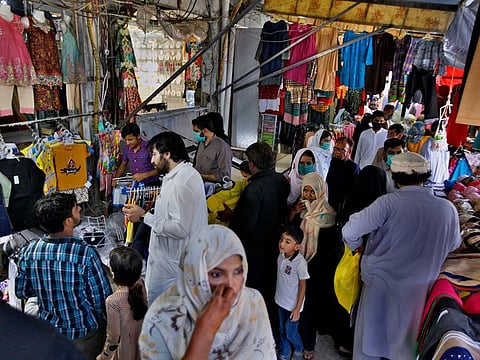COVID-19: Death toll in Pakistan rises to 1,197 in 24 hours
PM’s top aide on health warns of reinforcement of lockdown if rule violations continue

Islamabad: Pakistan’s number of coronavirus cases on Tuesday jumped from 56,350 to 57,710 — an increase of 1,360 in 24 hours — prompting the authorities to take stock of the anti-coronavirus strategy and mull various options, including withdrawal of ease in conducting businesses.
Besides new cases, 30 deaths were reported in a day, mostly from Sindh and Punjab, thereby taking the toll to 1,197, from 1,167 reported on Monday.
In the midst of this dismal scenario, the number of those who have recovered from the infection (more than 18,000) provides some consolation to the government that is pinning its hopes on natural immunity levels of the public to defeat the virus. With regard to frequent violations of the standard operating procedures (SOPs) by the people during the Eid Al Fitr holidays, Special Assistant to the Prime Minister on Health, Dr Zafar Mirza, has hinted that the country may be subjected to more stringent lockdown measures if the number of coronavirus cases and deaths continue to surge.
While talking to the media in Islamabad, Dr Mirza said Prime Minister Imran Khan had directed some relaxations in lockdown measures, keeping in mind the problems of the daily wage earners and low-income individuals and families, “But we have seen little regard for standard operating procedures in markets by the customers as well as shopkeepers during the Eid holidays. This can lead to further spread of the virus,” he cautioned.
He warned that any further disregard towards following the SOPs could worsen the situation as the number of those testing positive for the dreaded virus on a daily basis is skyrocketing.
As of now, 56,792 people have been detected to have contracted the virus, while 1,169 have died.
Dr Mirza said the government would assess the situation after the Eid holidays and decide on whether re-imposition of lockdown is necessary. “Pakistanis are under the wrong impression that the prevalence of the disease is reducing,” he said.
He said despite the government’s warnings, people interacted freely during the Eid holidays and the SOPs were not followed properly, which could lead to a “disastrous situation”.
He said social distancing and other precautionary measures were key to containing the spread of this contagious disease.
“We don’t know when this virus [pandemic] will end. There are some 37,700 active cases in the country and the numbers are rising,” he said. He revealed that capacity to conduct tests for the virus had been augmented and until last Sunday, 483,000 tests had been conducted while the recovery rate was 38 per cent.
Sign up for the Daily Briefing
Get the latest news and updates straight to your inbox



